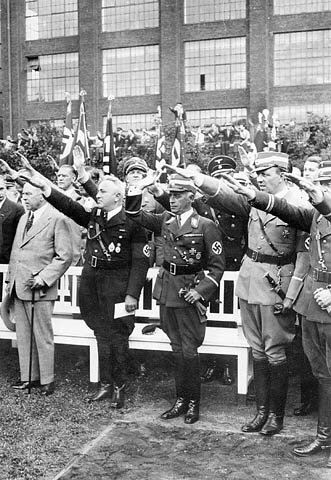Domestic Political Lead Up to the War
Canada was an ocean apart from the events in Europe that lead to the war, but Canadians were still affected by the rise of Hitler and lead up to war in Europe.
In June 1937, Liberal Canadian Prime Minister William Lyon Mackenzie King went to Germany to visit Hitler. He was quickly beguiled by the charismatic German Chancellor and left Germany under the impression that Hitler did not pose a great threat. King felt this despite the facts that Germany had adopted a policy of anti-Semitism and German troops had broken the 1919 Treaty of Versailles by remilitarizing the Rhineland. Ultimately, the Prime Minister was trying to avoid engaging Canada in another European war. The conscription crisis that divided French and English Canada, and the immense loss of life of the First World War was still on the minds of Canadians in the 1930s. Therefore, King supported the policy of appeasement of European leaders, including British Prime Minister Neville Chamberlain. Nevertheless, as the 1930s drew to a close and Hitler became more aggressive, King began to prepare Canada for the possibility of another war.
PRIME MINISTER KING AT THE ALL GERMAN SPORTS COMPETITION DURING HIS VISIT TO NAZI GERMANY, 1937. IMAGE COURTESY OF WIKIMEDIA COMMONS.
Britain declared war on Germany on September 3, 1939. However, Britain’s declaration did not automatically mean that Canada was at war too. In 1914, Canada was a self-governing dominion within the British Empire, however Canada did not have control over its foreign affairs. Therefore, when Britain declared war on Germany in August 1914, Canada was automatically at war too. In 1939, Canada was still a loyal dominion of the British Empire, but during the interwar years Canada gained more control over its foreign affairs. Following Britain’s declaration of war on September 3, Prime Minister King called a special session of parliament to decide if Canada would go to war.
On September 10, 1939, parliament decided that Canada would declare war on Germany. Even though Canada’s declaration of war came a week after Britain’s, there was no real doubt that Canada would join the war. Canada was still diplomatically and culturally connected to Britain. Nevertheless, the delay between Britain’s and Canada’s declaration of war against Germany was a significant symbolic step towards Canada’s autonomy.
The Second World War broke out in 1939, twenty-one years after fighting ceased in the First World War. WWI left belligerent countries broke and fatigued. The 1920s and 1930s presented their own ups and downs, including extreme global economic booms and busts. Though there were hints at the time, we can see through hindsight the lead up to the beginning of WWII throughout the 1930s. In this blog series, important local, national, and international economic and cultural events and attitudes are discussed as Canada and the world prepares to engage in another massive global conflict.


